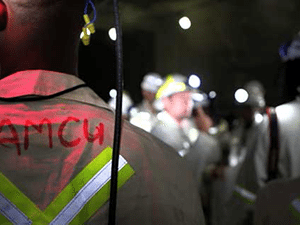
PLATINUM miners have started communicating a settlement wage offer directly to
employees after negotiations failed, making it increasingly unlikely that normal
production will resume before July.
The platinum companies, where more than 70 000 workers downed tools on Jan. 23,
will be using radio advertisements, SMS campaigns and mass meetings in Rustenburg
and in labour-sending areas to explain the offer directly to employees in an attempt to
end the strike.
The Association of Mineworkers and Construction Union (Amcu), which accused Anglo
American Platinum (Amplats) of providing inaccurate cost estimates of wage increase
proposals during the negotiations, said it, too, will use mass meetings to “expose the
behaviour of employers’. No further formal meetings between Amcu and the
employers have been scheduled.
“We are extremely livid at these underhand methods. It is difficult to predict how our
members will react and what mandate they will give us faced with this situation,’ the
union said. Amplats did not respond to specific questions on the talks.
In a joint statement with Lonmin and Impala, the miner urged Amcu’s leaders to take
the “fair settlement offer to their members and to let them decide’.
The settlement offer will see the minimum cash remuneration for entry-level
underground employees rise to R12 500 a month by July 2017, with increases
backdated to July 2013. Amcu is demanding a basic wage of R12 500 within three
years.
In a note to clients released on Tuesday, JP Morgan Cazenove said it is unlikely that
“normal’ production will be restored before July.
It may take up to two weeks to get a decision from workers on the settlement offer,
as many workers have returned to labour-sending areas remote from Rustenburg
before Easter, analysts Steve Shepherd, Allan Cooke and Abhishek Tiwari said in the
note.
Should workers accept the offer, it will take more time for production to return to
normal. “The workforce would have to muster, undergo comprehensive retraining and
in many cases heat-tolerance testing. This would put a huge strain on facilities and
resources designed for much smaller numbers at a given point in time,’ they said.
Once workers are ready to return underground, a safe start-up of stope faces could
take weeks. “Even if a decision to return to work was taken tomorrow (Apr. 23), we’d
be very surprised to see “normal’ production restored before July,’ JP Morgan said.
The wage offer is “on the limit of what is affordable’ to the mines and should
therefore be accepted, the bank said.









